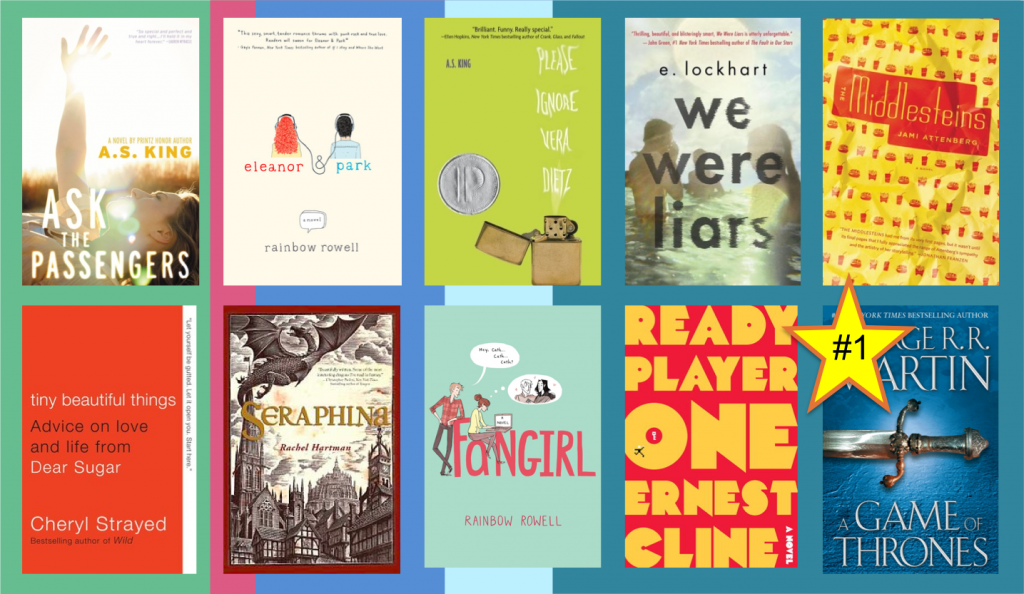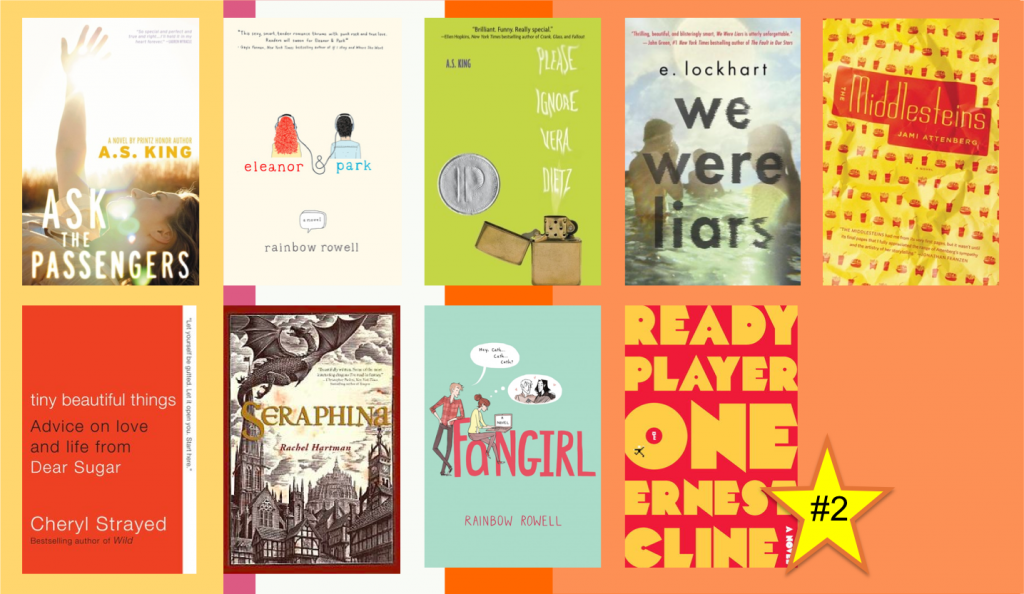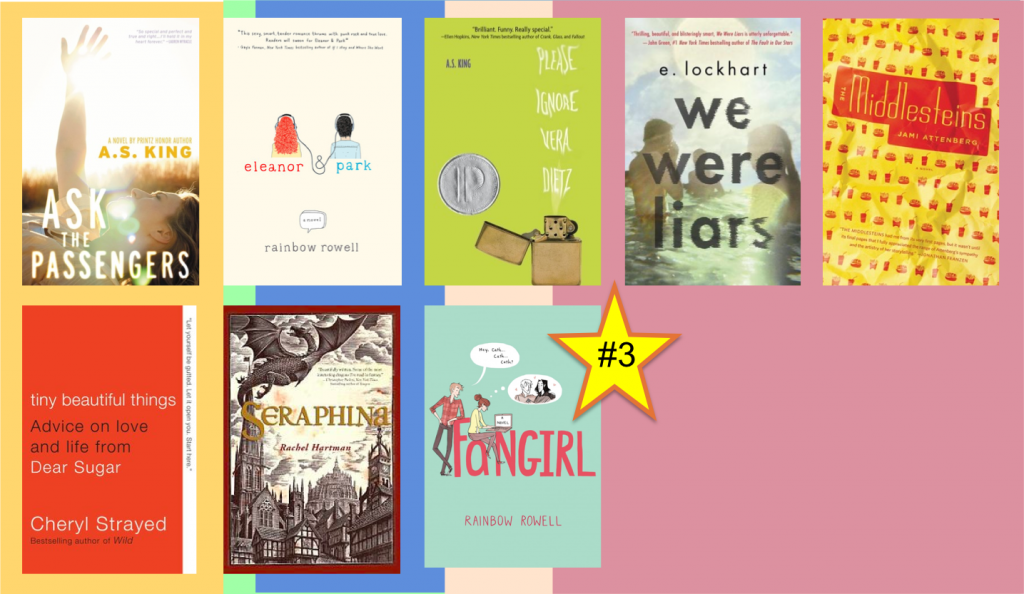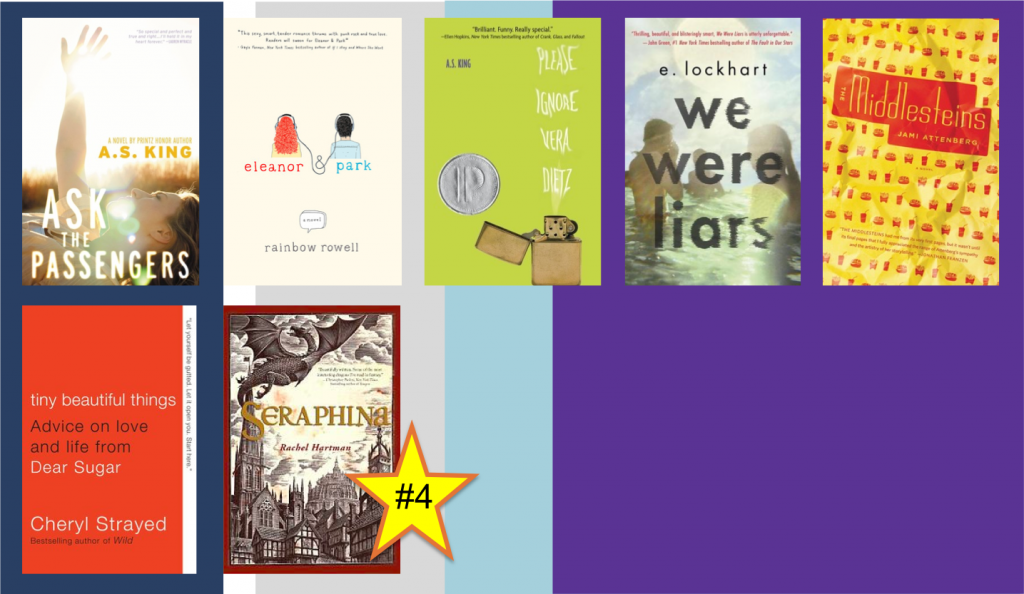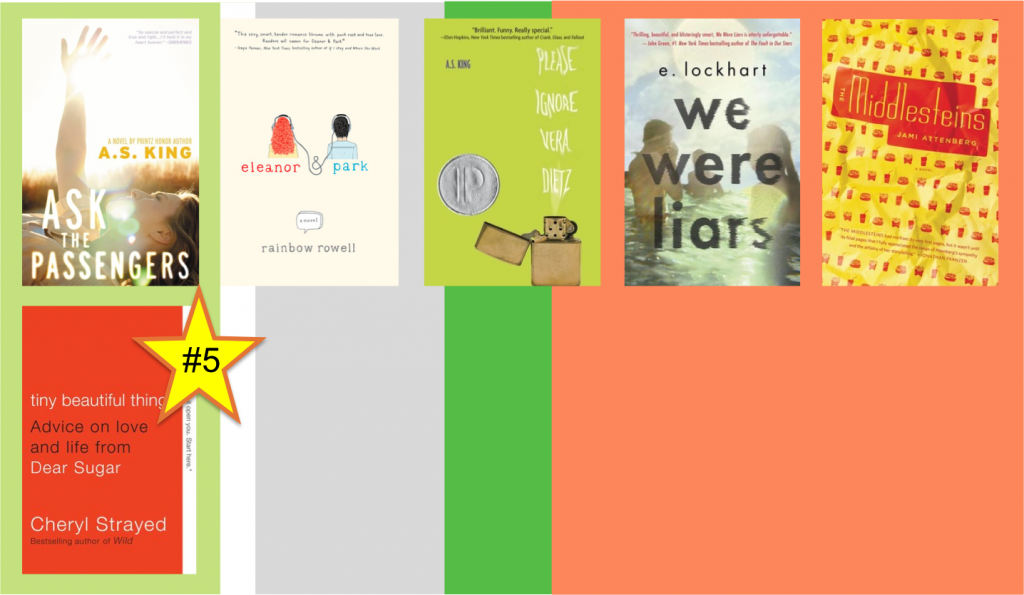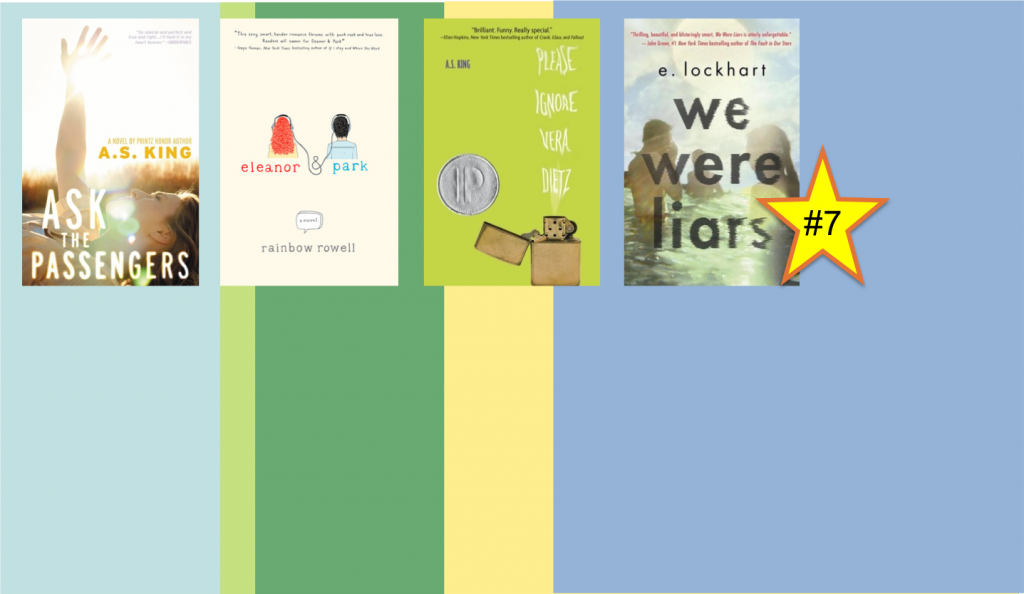Ladies and gentlemen,
(do gentlemen read this blog?)
I present to you…

[Subtitle: Jessica has fun with spreadsheets]
[could also be the subtitle to my life]
Just when you thought 2013 was well behind us.
I read 145 books in 2013. Goodreads only gave me credit for 140, but that’s because Goodreads doesn’t believe in reading the same book twice in one year. To Goodreads, I say, “pooh-pooh.” Although it is fairly useless to say anything to a database because a database does what a database does. Also, I will blame Amazon.
Stay on task, Jessica. I read 145 books. This is the most books I have read in a year. Ever. Applause, applause, applause. I would spend some time speculating about why the uptick in reading this year, but in 2012 I read 141, so maybe this is just where I’m at. I should, however, give credit both to a steady diet of professional review books and Cybils participation. What, you mean you didn’t spend a weekend on the couch reading 10 nonfiction books back to back? Hmm.
On to the fun stuff. I made pie charts, guys.
First, some broader data. How did my reading break down this year in terms of audience and format?
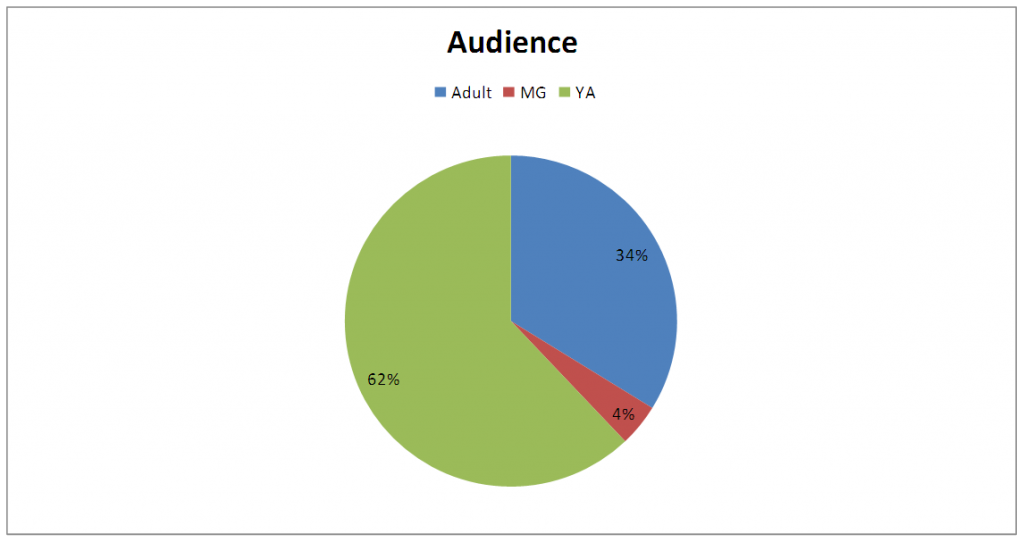
A majority of my reading was YA, but I was still surprised to see how many adult books I read this year!
This is also interesting because, as a person who reads YA and children’s books for various professional purposes, adult books are almost always “fun” reading for me.
- 12 of the adult books I read were audiobooks.
- 4 were ARCs I picked up at work – stuff that was getting media buzz, mostly.
- 3 were graphic novels.
- 2 were feel-goody re-reads
- 4 were… ah… filthy
- 6 were Game of Thrones
The rest were a mixed bag of last year’s best fiction, memoirs, creative advice books, and even one book from my Unread Library.
I only read 6 middle grade books. This is normal, but looking at that little pie sliver makes me think I should try to read a few more next year. Middle grade isn’t really my particular wheelhouse, but I’m thinking of some Horn Book editorial about YA taking all the credit/attention/page space away from children’s literature (see also: The World Thinks Anything That Isn’t a Picturebook is YA), which rankles me a bit. Perhaps more on this later?
So what kind of YA was I reading this year?
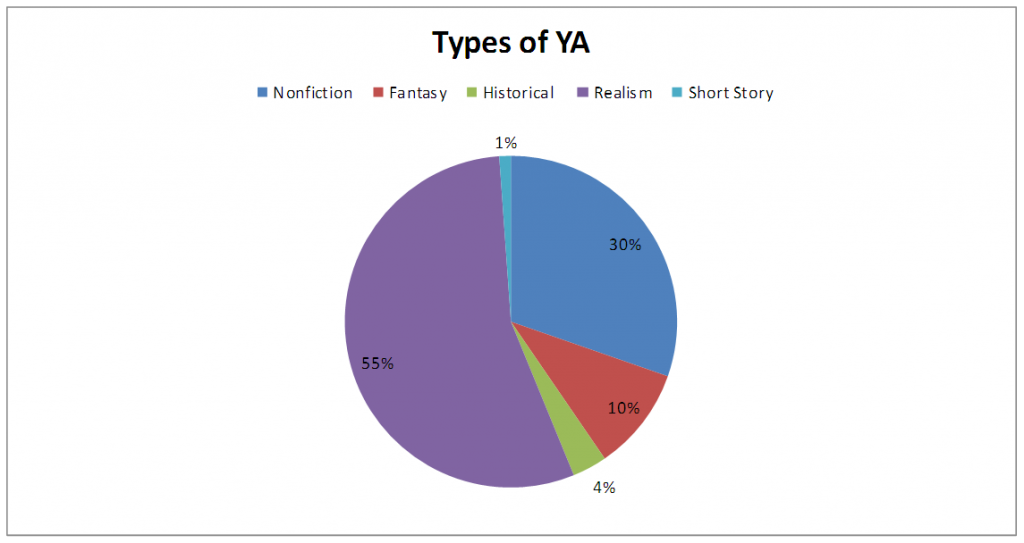
Despite threatening to become a fantasy fan, I’m still reading mostly realism, at least when I read YA. I’ll be interested to see how this compares to next year’s stats.
That big 30% of the pie is thanks to Cybils, and a lot of my realism reading is for review. This made me curious about how much of my reading was “required” and how much was not. This is a blurry issue – when given free reign over my reading, I will still tend toward books that help me keep up with trends or to gain a better perspective of the genre. I try to read award winners and classics and such. However, exactly how much of my reading is left up to me, and how much is straight up You Have to Read This Jessica Or Face Consequences?
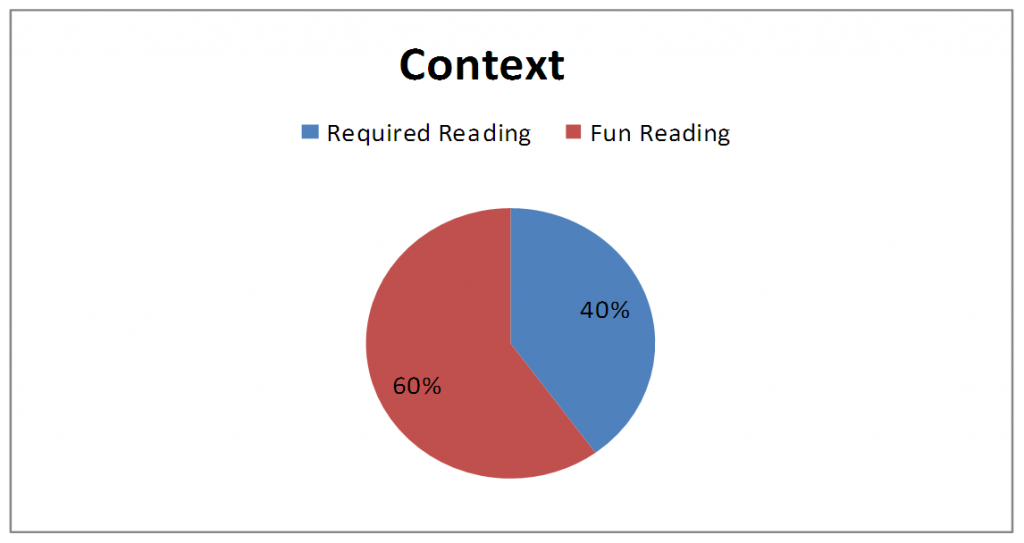 At various times during the year I have felt completely swamped by required reading. Looking at this chart makes me feel like a bit of a whiner. Or at least reminds me that while I have months where I am pining over greener book-pastures, I also have months where no deadlines loom and I can’t be bothered to read anything.
At various times during the year I have felt completely swamped by required reading. Looking at this chart makes me feel like a bit of a whiner. Or at least reminds me that while I have months where I am pining over greener book-pastures, I also have months where no deadlines loom and I can’t be bothered to read anything.
See also: this month.
It also stands to mention that 100% of my required reading is YA or MG. The amount of free-reign YA reading I am doing is a bit less than my free-reign Adult reading – about 37 YA free reads and 49 adult free reads.
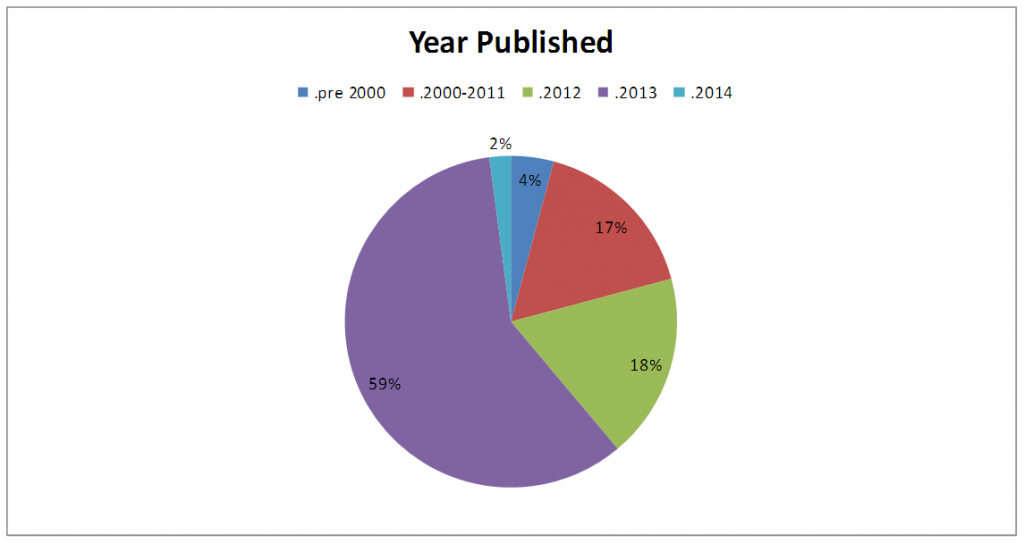
This chart could also be labelled “More Evidence That Jessica Has Complex Personal Issues Regarding Classic Literature.”
A more gracious interpretation could be that a lot of my 2013 reads fall under the category of Required Reads. 2012 was a lot of catching up on fun reading. 9 of the 23 books I read that were published between 2000 and 2011 were re-reads – comfort reading.
I am torn between wanting to give more of my pie to reading new books. I really should have read more 2014 books by now, from a professional standpoint and also a YOU ARE NEVER GOING TO CATCH UP WITH READING ANYTHING standpoint. But oh, I want to read more older stuff, I do.
In case you missed it, we have reached the point of this long, long post where I start to freak out because there are only so many more years in my life and what if I die before I read All Of The Books? Heaven help me…
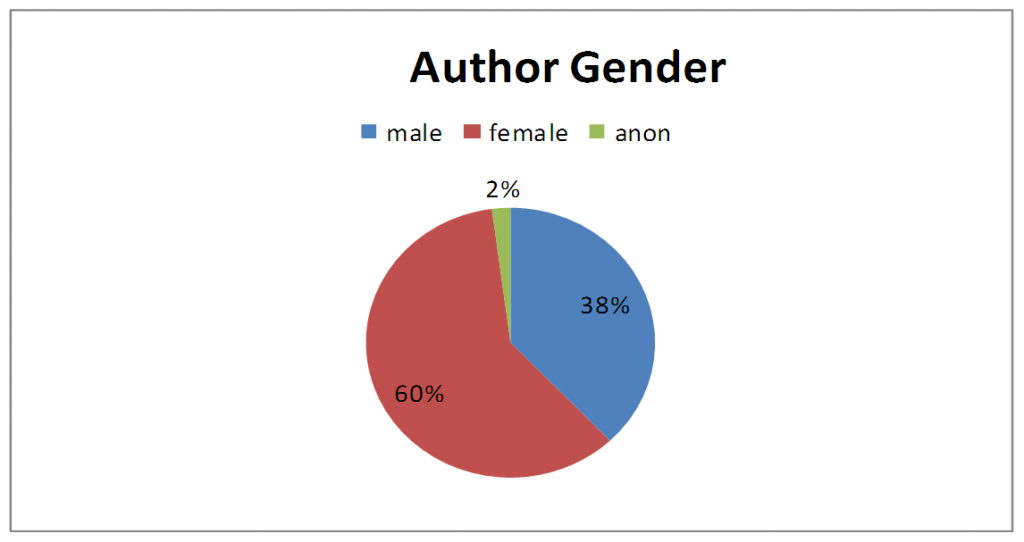
I wanted to run this chart to make sure I am reading equitably, but I wasn’t really concerned about my performance. I naturally tend towards female writers, and I’m kind of on the girly YA beat for some of my professional reviewing. I am actually more interested in whether or not I am reading books written by and about folks of different ethnic backgrounds, but I didn’t keep that data this year. Next year, though, I will.
And last but not least…. is the printed book dead?????
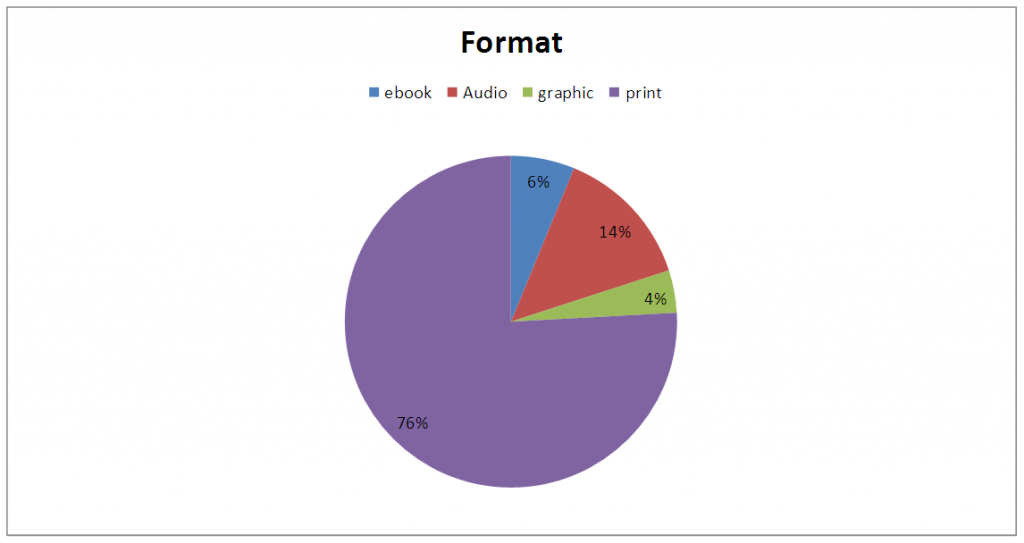
No. Not in the Jessica-sphere anyway. I got an iPhone in January and a Kindle Fire in March. I still only read 9 ebooks out of 145. My problems with ebooks are as follows:
- I work at a library. I don’t need to buy books unless I want to have my own copy of a favorite or support an author. If I’m going to do that, I’m going to buy a print copy.
- I do check out ebooks from my library’s Overdrive collection, but you guys know how awful I am with reading books I check out. That same 14-day reading limit that inspires me to muscle through audiobooks has the opposite effect on my e-reading – once my hold finally comes in, I’m usually busy reading other stuff so I pretty much ignore them.
- I like Netgalley & Edelweiss in theory, but so many of the books I’ve rented are so poorly formatted that I don’t actually read them.
I could also tell you how much money I spent this year buying print books for the library, but let’s suffice to say that it was a lot of money.
Other reading stats of note:
- I read 5 Alex Award winners
- I read 1 Boston Globe Horn Book Award winner and 1 honor
- I read 4 Cybils Award winners (2 YA fic, 1 SFF, 1 MG)
- I read 7 National Book Award finalists
- I read 3 Printz Honors
- I read 1 William C Morris winner and 1 finalist
- I read 3 YALSA Nonfiction Award finalists
- I listened to 11 Overdrive audiobooks between September and December.
- I read 39 YA fiction books by authors that were new to me.
- I re-read 12 books.
- I read 33 books for professional review.
And I “reviewed” 21 books here for this here blog. I was aiming for 1 a week, but you know… I’ll take it.
What’s in store for next year? Well, I have thoughts and pie charts on that topic too, but I will save those for a later date. When you are better rested after making it through this ridiculous, naval-gazing exercise.
I don’t say this enough, but thank you for all of you – my readers – who show up here and watch me gaze at my naval. I like all of you. I do. Thanks for letting me share my 2013 with you.








